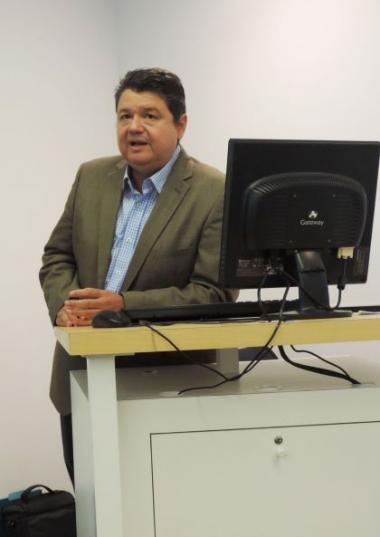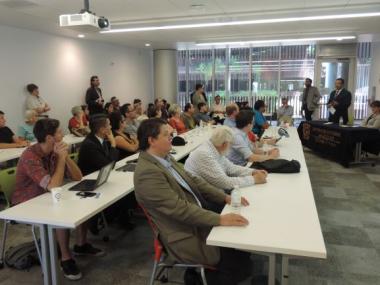Visiting UNAM Researcher Presents on Impact of Mexico Election
Facebook Photo #1_0.jpg

Dr. Roberto Zepeda-Martinez, a researcher at Centro de Inverstigaciones sobre America del Norte, presented to a full room to discuss the timely topic of the presidential election in Mexico.
Dr. Zepeda-Martinez arrived in Tucson earlier this month to continue collaborative research with the University of Arizona. During his time at the university, he presented a lecture titled, “The Impact of the Mexican Presidential Election in the United States, Canada, and Mexico Relations.”
The lecture was attended by individuals from the university, community, and included additional special guests from the Universidad Nacional Autonoma de Mexico.
Dr. Zepeda-Martinez answered follow-up questions at the conclusion of his presentation:
What is the most important message that you hope your listeners took from your lecture today?
“After the 2018 presidential elections, Mexico consolidated his democracy. Citizens participated and cast their vote in these peaceful elections, and by first time in recent history a left-wing oriented candidate, Andrés Manuel López Obrador (AMLO) was elected in this country. All the presidential candidates accepted the results in the same day of the election. This is a demonstration that electoral institutions function in Mexico, which is now a robust democracy. It was a victory of democracy but also of the citizens who participated in this election. After this election, there has been a major change in Mexican politics. MORENA (National Regeneration Movement), a moderate left-wing party created by AMLO in 2014, has become the main political party in Mexican politics. Also, there was a collapse of the PRI, the current ruling party, and the PAN (National Action Party) has become the main opposition party. The parties that formed an alliance with MORENA, such as the PT (Worker’s Party) and ES (Social Encounter), are now more relevant in the Congress, considering their number of seats.
AMLO had a landslide victory in the presidential elections, as he received 53.2 percent of the total vote. This is the highest percentage obtained by any candidate in previous presidential elections. MORENA led coalition won not only the presidential elections but also the majority in both Chambers of the Congress. Moreover, it won 5 out 9 governorships that were renovated in the past election. This means that the next president of Mexico will have more leverage to promote his own policies in both the national and subnations spheres.
Mexicans were tired of insecurity, violence and corruption scandals. They wanted a change and opted for a new political party, MORENA. Mexico’s decision was a rejection to the two political parties that have governed Mexico in the last 90 years: the PRI and the PAN. Mexicans decided to vote for AMLO, a leftist politician who promised two main proposals: reduce salaries of government officials and tackle corruption. In my opinion, MORENA is not a radical leftist party, but it is a moderate left which is more in tune with neoliberal economic policies. For instance, it supports NAFTA.”
Why do you feel this lecture is an important message to deliver to the University of Arizona?
“It is an important message because the University of Arizona is one of the leadings universities in the U.S. and is always generating valuable discussions about current issues of the US. – Mexico bilateral agenda. Mexico is a close trade partner of the U.S. and a crucial ally in terms of migration and security. During the last two decades, economic relations in North America have consolidated, mainly after the North American Free Trade Agreement (NAFTA). This agreement, signed in 1994, helped the expansion of trade in the region and integrated Canada, the United States and Mexico into a free trade economic region, which currently has around 480 million consumers. Measured in terms of its regional GDP, NAFTA is the largest economic free trade zone in the world.
Therefore, it is relevant to analyze the recent political transition in this country after these 2018 elections. The president-elect of Mexico, Andres Manuel López Obrador will take office in December 1st, 2018. However, he has already outlined his main proposals, which do not include major changes in terms of economic policies. He pursues a successful negotiation of NAFTA. Indeed, AMLO is open to a bilateral trade agreement between México and the U.S., without Canada.
audience.jpeg

Regarding the overall security strategy, AMLO has a different perspective, comparing with his predecessor Enrique Peña Nieto. For example, he has mentioned that reducing poverty and fighting corruption will be two major actions of his government in order to counter violence and crime. He argues that providing more employment and education opportunities will reduce the recruitment of young people by organized crime groups. Similarly, creating economic prosperity and more opportunities for the poorest will reduce the levels of violence in Mexico.
Cooperation between Mexico and the U.S. will continue in terms of migration. AMLO is more open to U.S. proposals regarding migration from Central and South America, which goes through Mexico, for example, the creation of a Border Patrol in Mexico to contain such migration flows. AMLO conditions this support to more U.S. assistance and cooperation in order to promote economic development in Mexico and Central America and, in that way, reduce the migration to the U.S. This also opens perspectives for a bilateral migration agreement between Mexico and the U.S., including temporary workers in the agricultural sector and other labor occupations.
AMLO has proposed a comprehensive deal to create jobs, lower immigration and improve security. Lopez Obrador has stated that Mexico’s cooperation with the U.S. in terms of migration and security is an alternative to Trump's border wall. It is very early to say how the U.S. – Mexico relations will be, but certainly there is a positive communication between the two leaders of these countries and that is a good beginning. AMLO is a pragmatic leader. He is open to U.S. proposals regarding NAFTA, and it would support a bilateral trade with the U.S. and would create a Mexican border patrol to contain migration from Central and South America. Finally, we can say that a formal meeting between AMLO and Trump is also very likely in the short term.”
Dr. Zepeda-Martinez will be presenting another lecture on July 24, 218 at 5:30 pm at Consulate General of Mexico in Spanish titled, “La paradiplimacia como alternative ante los retos de America del Norte.”

